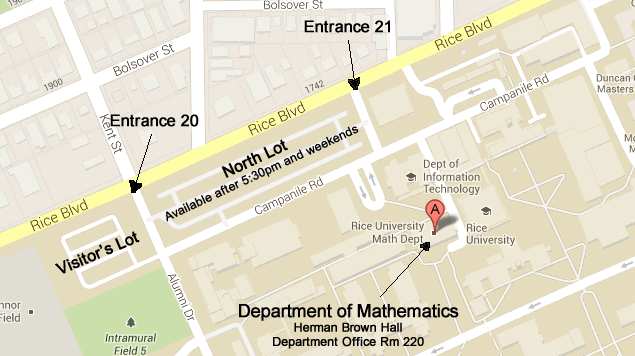2013 Ph.D Thesis Defenses
Taylor Martin
Title: Lower order solvability of links
Date: Friday, April 12, 2013
Thesis Advisor: Shelly Harvey
Abstract:
The n-solvable filtration of the link concordance group, defined by Cochran, Orr, and Teichner in 2003, is a tool for studying smooth knot and link concordance that yields important results in low-dimensional topology. We focus on the first two stages of the n-solvable filtration, which are the class of 0-solvable links and the class of 0.5-solvable links. We introduce a new equivalence relation on links called 0-solve equivalence and establish both an algebraic and a geometric characterization 0-solve equivalent links. As a result, we completely characterize 0-solvable links and we give a classification of links up to 0-solve equivalence. We relate 0-solvable links to known results about links bounding gropes and Whitney towers in the 4-ball. We then establish a sufficient condition for a link to be 0.5-solvable and show that 0.5-solvable links must have vanishing Sato-Levine invariants.
Reagin McNeill
Title: A new filtration of the Magnus kernel
Date: Thursday, April 4, 2013
Thesis Advisor: Shelly Harvey
Abstract:
For a oriented genus g surface with one boundary component, S_g, the Torelli group is the group of orientation preserving homeomorphisms of S_g that induce the identity on homology. The Magnus representation of the Torelli group represents the action on F/F'' where F=π_1(S_g) and F'' is the second term of the derived series. I show that the kernel of the Magnus representation, Mag(S_g), is highly non-trivial and has a rich structure as a group. Specifically, I define an infinite filtration of Mag(S_g) by subgroups, called the higher order Magnus subgroups, M_k(S_g). I develop methods for generating nontrivial mapping classes in M_k(S_g) for all k and g≥2. I show that for each k the quotient M_k(S_g)/M_{k+1}(S_g) contains a subgroup isomorphic to a lower central series quotient of free groups E(g-1)_k/E(g-1)_{k+1}. Finally I show that for g≥3 the quotient M_k(S_g)/M_{k+1}(S_g) surjects onto an infinite rank torsion free abelian group. To do this, I define a Johnson-type homomorphism on each higher order Magnus subgroup quotient and show it has a highly non-trivial image.
Contact Information
Tel (713) 348-4829
Mailing Address:
Rice University
Math Department -- MS 136
P.O. Box 1892
Houston, TX 77005-1892
Physical Address:
Rice University
Herman Brown Hall for Mathematical Sciences
6100 Main Street
Houston, TX 77005

